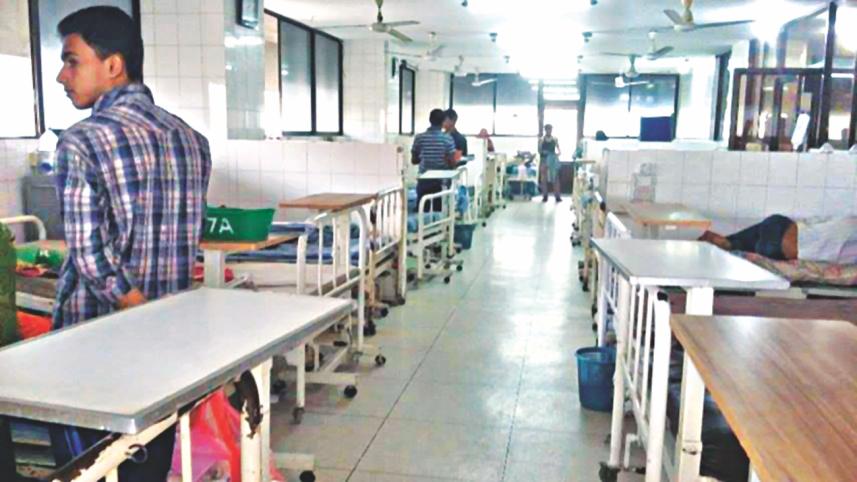Doctors turn their back on patients

Khadiza Begum had been discharged from the psychiatric department of Bangladesh Medical College Hospital on March 11 and was asked to follow up with her consultant eight days later, on March 19.
When she came on the due date, she was told the doctor was unable to see her. After waiting for the whole day, she returned and came back again yesterday, but to no avail. The hospital staff said the doctors had been on a strike since March 15.
Her husband, Shelen Hawlader, accompanied the 45-year-old patient of depressive disorder and hypertension to the hospital at the capital's Dhanmondi.
“I came from Bhola two weeks back. I have no place to stay in Dhaka. I'm staying at distant relatives' houses now. For how many days can I do this?” asked Shelen.
He started from home with Tk 20,000 for her wife's treatment and the travel to Dhaka, and it almost ran out. “I am totally helpless now. The condition of my wife has not improved yet,” he said, sitting at the outdoor waiting room yesterday afternoon.
Touhidul Islam of Sreepur in Gazipur faced a similar situation when he went there on a follow-up visit with her wife suffering from urological complications.
A ward boy suggested that they see the doctor at Ibn Sina Hospital where he sits in his chamber at 7:00pm. “I can meet him there although the fees would be higher. But can I go home at night then?” he asked.
Amid the strike, which started over the transfer of a doctor, the nearly 500-bed hospital is seeing a decline in the number of patients. Average occupancy of the beds was 250-300 daily, but it was only 124 yesterday.
Prof Dr Abdur Rouf Sarder of BMC said emergency, ICU, CCU, indoor services were available.
Requesting anonymity, an official said, "Those who have no alternatives are staying indoors. Others are leaving.”
A mother of an inpatient said her 12-year-old son underwent a surgery last week, but he was now suffering from continuous fever.
“Doctors do not see my son regularly. They instruct the nurses via the mobile phone. Is this a system? I am afraid of my son's condition,” she said.
Prof Rouf Sarder, who was recently removed from his additional duty as a director by the Bangladesh Medical Studies and Research Institute (BMSRI), parent body of BMCH, said the doctors, teachers, and interns began the strike a day after transfer of Dr Saiful Islam, a medical officer of BMCH, Dhanmondi, to Uttara Adhunik Medical College Hospital on March 14.
He said around three months back, some doctors and teachers complained to the Anti-Corruption Commission (ACC) about the alleged corruption of some BMSRI staff. Transfer of Dr Saiful was a result of that, he said.
He further said the strike was triggered by a conflict between BMSRI and BMCH's governing body, which had been going on for the last three years.
Contacted, Prof Niaz Ahmed Chowdhury, honorary secretary of BMSRI, told this correspondent that if there was any allegation of corruption, there was a due process to follow.
An investigation regarding this is going on, and the health ministry has taken the probe over from ACC, and so there were no grounds for a strike that puts patients in trouble, he added.
“We have transferred Dr Saiful Islam for his unruly behaviour,” he said, adding that they would take legal action against such behaviour of a small section of doctors and teachers who wanted to control the hospital.
Dr Saiful Islam, who was transferred, said as per the law, the governing body would govern BMCH, not BMSRI.




 For all latest news, follow The Daily Star's Google News channel.
For all latest news, follow The Daily Star's Google News channel.
Comments